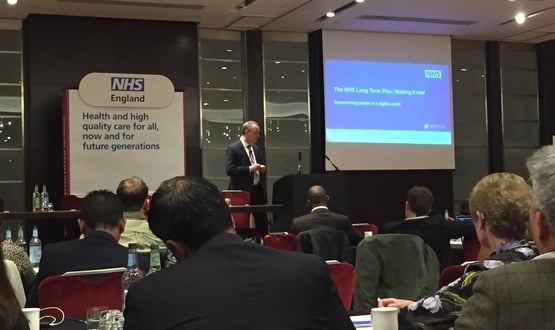Swindells says GDEs must not be “digital havens surrounded by paper”
- 15 February 2019

NHS England’s deputy chief executive has said the global digital exemplars (GDEs) must not become “havens” surrounded by “deserts” of paper records.
Speaking at the ‘Empowering people in a digital world’ conference on 13 February, Matthew Swindells – who also serves as the body’s national director of operations and information – discussed how technology fits into the Long Term Plan.
Swindells said: “This is the first time the NHS had had a strategy where technology is at the absolute heart of it, so there’s a burden on everyone in the room to deliver the technology.”
This includes through the global digital exemplars (GDEs), he said. NHS England’s flagship programme is designed to create a group of reference sites for NHS digitisation that provide standardised blueprints for other trusts to follow.
However Swindells stressed the GDE sites mustn’t become “havens” of digital surrounded by “deserts of paper records”.
He also made reference to the Local Health and Care Record Exemplars (LHCREs), another NHS England programme. Five areas were awarded £7.5 million in national funding to develop an electronic shared local health and care record.
Digital innovation through these schemes – and more broadly – will according to Swindells get the NHS back to “being the national health service rather than the national sick service”.
He added: “Technology makes the NHS’ future secure”.
Swindells used his speech as an opportunity to thank his former colleague Juliet Bauer.
Bauer left her position as NHS England’s chief digital officer in January 2019 to take up a global product role at online GP consultation provider, LIVI.
Speaking about his former colleague, Swindells thanked Bauer for all the work she had carried out adding “we wouldn’t be here without her”.
He said he was “disappointed” but “not surprised” by Bauer’s move.
Matt Hancock also addressed the conference. The secretary of state for health and social care called for greater use of email communication within the NHS.




